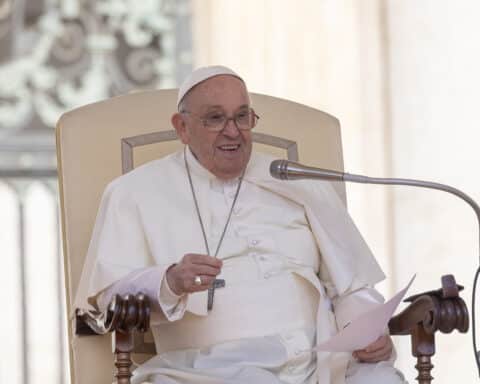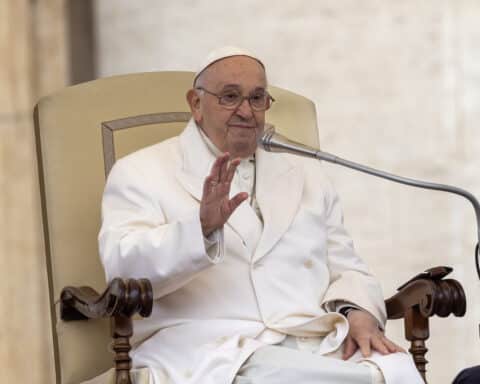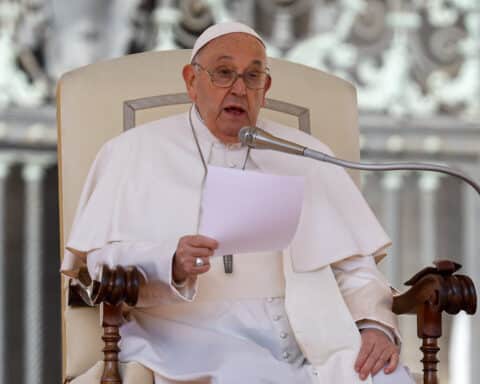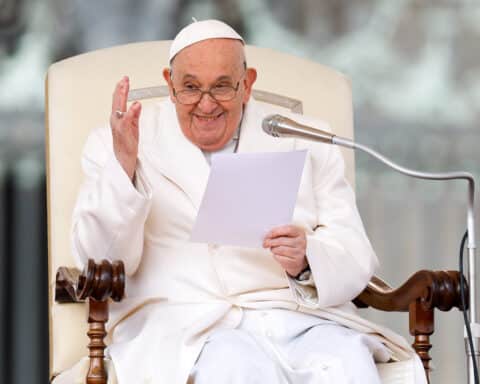Faith, hope and love. These three theological virtues should be the very foundation of our spirituality. Yet, sadly, faith, hope and love seem to be greatly lacking in much of our public lives today. We see this in the strife that divides people over such critical issues as the coronavirus, politics, inequality, environmental concerns and justice for the poor.
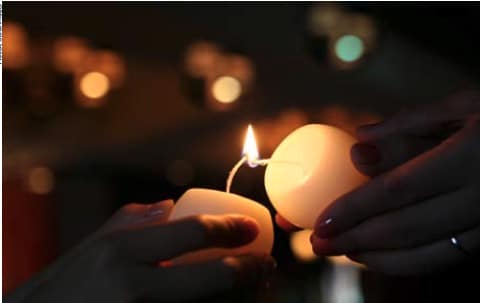
It is not surprising that the most basic virtues of faith, hope and love are forgotten. Foundations are often overlooked. We simply assume they are there. The foundations of our homes are often drab concrete or dusty stone. We don’t give them much attention unless they start to leak. But today, the spiritual foundations of our world are leaking. We assume we have faith, hope and love because we received them in the sacraments. But these gifts from God are not drab building materials we can ignore. They are great gems, and they need polishing.
In his spiritual classic, “Dark Night of the Soul,” St. John of the Cross envisioned these three basic virtues as colors. He wrote that faith should be a “whiteness so pure that it completely dazzles the eyes.” He said our hope should be a lush green because all other things of this world are “dry, and faded and dead and worth nothing,” compared to a growing hope in Christ. Finally, he saw love as the royal color of purple, because love calls us to “rise to so lofty a point that we are brought near to God, and become very beautiful and pleasing to him.”
Using St. John’s colors, maybe we can begin to see these basic virtues as the treasure they are by thinking of faith as a diamond, hope as an emerald and love as an amethyst.
A treasure fable
There is an often-told, old story of a hermit living in the forest who was rumored to have the most beautiful diamonds, emeralds and amethysts anyone had ever seen. One day a young man went into the forest to see these great jewels. When the man found the hermit, the old man gladly brought the gems out for the young man to see. Surprisingly, the hermit asked the young man if he would like to have the gems. Not believing his luck, the young man grabbed up the sparkling jewels and ran home.
Once home, the young man became consumed with the need to hide and protect the jewels. He dug holes under his bed. He bought new locks to secure his door. He was afraid to go out and leave the gems unprotected. He became so obsessed with hiding the gems that he found no joy in having them at all. After many sleepless nights of worry, the young man grabbed up the treasure and headed back into the forest. When he found the hermit, the young man angrily declared, “You did not give me the greatest treasure!”
“What do you mean?” asked the hermit. “You said you wanted the jewels.”
The young man sadly shook his head and said, “I want whatever it is in your heart that let you so freely give these gems to me. That is the greatest treasure.”
The wisdom of Sirach tells us, “Wealth or wages can make life sweet, but better than either, finding a treasure” (40:18). The theological virtues of faith, hope and love are our greatest treasure. We must learn not only how to find them in our lives but also how to freely give these gems away.
|
“I believe though I do not comprehend, and I hold by faith what I cannot grasp with the mind.” — St. Bernard |
Finding the diamond of faith
In his encyclical letter, Lumen fidei (“The Light of Faith”), Pope Francis calls faith “a star to brighten the horizon of our journey” (No. 4). Today, more than ever, we need that star of faith. We need that shimmering diamond that is the hardest substance on earth. We need a faith that can lighten our darkness and scratch through anything.

Conversely, our faith can be threatened when we spend too much time engaging in the things of this world — the faithless things we often find in secular and social media. Certainly, people of faith are not called to hide away from the world. But we must always balance the things of the world with the things of God.
So where do we learn that kind of diamond faith? St. Augustine in his “Confessions” says a turning point in his own faith came one day when he saw a Bible at his friend’s house. At this point, Augustine was not a man of faith at all. But he heard God whisper, “Take and read.” God calls us to do the same thing. Pick up Scripture and read it. Every day! It is the perfect way to strengthen our faith.
St. Paul tells us, “faith comes from what is heard, and what is heard comes through the word of Christ” (Rom 10:17). To find our truest, brightest, most sparkling faith, we need to spend more time listening to God and less time listening to the world.
|
“Faith, if it is to grow, has to begin ever anew. It needs to be sparked by desire, to take up the challenge of entering into a living and lively relationship with God.” — Pope Francis |
Giving away our faith
Faith calls us to open our hearts and minds to all people. It is not faith to think that God only speaks to certain people. It is arrogance. It is putting God in a box that is too small for him. Pope Francis tells us “Faith is passed on … by contact, from one person to another, just as one candle is lighted from another” (Lumen fidei, No. 37). Thus, we must carry our faith everywhere we go — always looking for a candle we can light for someone else.
One of the best ways to make our faith glow is to be an active part of a faith community. In 2020, in the midst of the COVID crisis, Pope Francis released the book “Let Us Dream.” In it he said, “No one is saved alone. Isolation is not part of our faith.” By participating in Bible studies, social services or prayer groups, we grow our own faith and the faith of others. It is also easier for an active faith community to evangelize together than it is for one person to go out alone and spread the faith. Inviting a person weak in faith to participate in an activity we enjoy at our parish is a great way to pass on that light of faith.
Certainly, that does not mean we keep our faith to ourselves except when we are at church. We can give a silent witness to our faith with a Bible on our side table, a crucifix by the door, a statue on a shelf or a rosary by our chair. These are diamonds we must pass onto others. They can be conversation starters about our faith. The outward signs of faith mean nothing, however, if we do not radiate goodness and joy. This is what will most attract others. They must see how our faith makes us better, kinder and more joyful. Just as he did with St. Augustine, God will encourage people to look deeper into what gives us our goodness when they see both the visible witness of our faith and the joy in our hearts.
|
|
Finding the emerald of hope
Ideally, faith in God leads us to hope. However, it can be hard to find a growing sparkling emerald of hope when we are crushed by endless news of devastating storms, brewing war, COVID deaths, gang violence and starving children. The news we see now goes far beyond our own backyard. We are overwhelmed by horrors from all across the globe. This kind of modern worry calls for a new form of modern hope. We can find that hope in modern saints.

Pope John Paul II chose to canonize St. Faustina Kowalska as one of the first saints of this new century. He firmly believed this century would need the kind of hope St. Faustina taught us when she introduced us to the divine mercy of God. St. Faustina had frequent visions of Our Lord with mercy pouring from his heart. Recounting these visits from Jesus, Faustina wrote, “One thing alone is necessary; that the sinner set ajar the door of his heart, be it ever so little, to let in a ray of God’s merciful grace, and then God will do the rest. … For Jesus is our hope.”

Trust. Mercy. Eucharist. These three can give us a lush, green, growing hope even in today’s crazy world.
|
|
Giving away our hope
In “Let Us Dream,” Pope Francis tells us: “We currently have historically unprecedented levels of inequality. Barely more than one percent of the world’s population owns half of its wealth. Millions are robbed of hope!” With so many people lacking hope, it should be easy for us to give away some of our own hope. The problem is those who are robbed of hope need more than just a “thinking of you” card or a meal delivered to their door. This is cheap hope — easy and good to give — but not enough for today’s despair. God is calling us to spread the emerald of hope much further than that!
We need to step out of our comfort zone if we want to give a hope that can change the world. We need to put ourselves in the shoes of another. We have to think how we would feel if we watched the beloved forest that was our home being ruthlessly destroyed. We must place ourselves in the heart of the mother who sits in a dirt floor home and gives her child muddy water to drink. We need to feel the pain of the young man brutally beaten because he is unwilling to fight in a drug war. We need this kind of deep compassion.
Using the words of the popular peace prayer of St. Francis, people often pray, “Where there is despair, let us bring hope.” What can we do to bring that kind of hope? It is going to take some sacrifice. It is going to mean giving up some of our material wants so we can give the financial support needed to end our world’s overwhelming despair.
We need to be generous, not only with prayers but also with money and action. It should not surprise us that we must make sacrifices to give hope. When we consider that our own wonderful gift of hope comes from Our Lord’s overwhelming sacrifice on the cross, is this really too much to ask for us, too, to give a little more to save our world?
Finding the amethyst of love
“Nothing and no one can separate us from his redeeming love,” Pope Francis said on March 27, 2020, during his urbi et orbi blessing, giving us this beautiful promise when the world stood on the brink of the COVID pandemic. Although God’s love may not have stopped the spread of the disease, we have seen it played out over and over again in the way people have helped and cared for one another in the last two years. Love is what makes every aspect of our lives better — even fear, isolation and sickness.

The secret to finding the love we are missing is forgiveness. Pope Francis wrote: “If we accept that God’s love is unconditional, that the Father’s love cannot be bought or sold, then we will become capable of showing boundless love and forgiving others even if they have wronged us” (Amoris laetitia, “The Joy of Love,” No. 108).
Forgiveness is the key to finding love. It works like this:
Know that God is always a forgiving God. No matter our faults or sins, we can open our hearts and feel his love pouring down upon us like sparkling amethyst glitter — clinging to everything and impossible to wipe away.

Once we are able to admit, forgive and love our own imperfections just as God loves us, then we are able to forgive and love the flaws and weaknesses we see in others.
And this is real love. Loving what is perfect is just infatuation. Loving what is flawed is true, deep and eternal love. This is the kind of love God always gives to us. This is the kind of love God asks us to give to others.
|
“Do not forget that true love sets no conditions. It does not calculate or complain, but simply loves.” — Pope St. John Paul II |
Giving away our love
In his letter to early Christians, James wrote, “fulfill the royal law according to the scripture, ‘You shall love your neighbor as yourself'” (2:8). St. Paul also stressed that love was the crowning virtue: “So faith, hope, love remain, these three; but the greatest of these is love” (1 Cor 13:13). Thus, it is not surprising that St. John of the Cross would assign the royal color of purple to love.
These saints are only making clear what Jesus always taught. Jesus made love the defining virtue for all Christians by challenging Peter, “do you love me?” (Jn 21:15). When Peter answered, “yes,” Jesus commanded that Peter show that love by going out to “Feed my lambs.” This exchange was repeated three times in the Gospel to enforce for us that our love must be given away. Just like Peter, each of us must tend the sheep of the world with our love.
The virtue of love must always be an action. Love is not just something beautiful to hold in our hearts. Love is the help we offer, the hand we reach out, the steps we take to draw closer to someone in need. St. Ignatius of Loyola told us, “Love is shown more by deeds than by words.”
St. Paul also described love by what we do. He told us: “Love is patient, love is kind … it is not quick-tempered, it does not brood over injury. … It bears all things, believes all things, hopes all things, endures all things. Love never fails” (1 Cor 13:4-7).
It can be a struggle to always give this kind of love. That is why we need to treasure God’s own majestic love and let it forever guide us. When we are able to love in this forgiving and accepting way, we are living as the royal children of our heavenly king.
|
|
A crown of three jewels
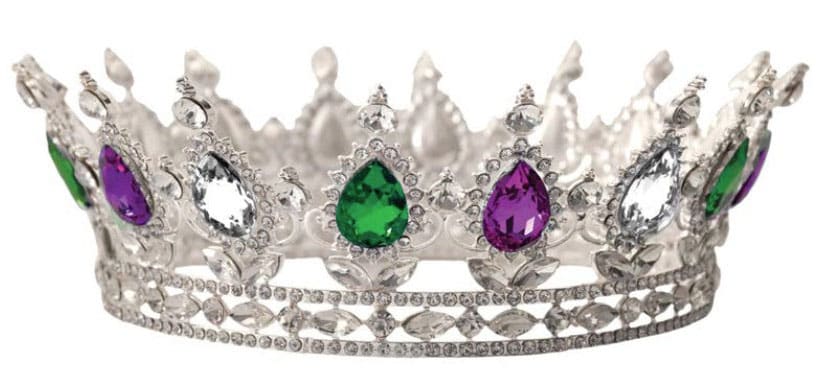
We simply cannot have one of these virtues without the other two. Our world today is falling apart because people think they can just have hope without faith, faith without love, or love without hope. G.K. Chesterton wrote, “The only argument against losing faith is that you also lose hope — and generally charity.” How very true that is! When we discard one, we always lose the other two. We need to polish these virtues every day and let the world see how these gems bring us joy, peace and wisdom.
Susan M. Erschen writes from Missouri.
| A prayer for treasured virtues |
|---|
|
|




 “Hope has two beautiful daughters: their names are Anger and Courage. Anger at the way things are and Courage to see that they do not remain as they are.” — St. Augustine
“Hope has two beautiful daughters: their names are Anger and Courage. Anger at the way things are and Courage to see that they do not remain as they are.” — St. Augustine “We need the greater and lesser hopes that keep us going day by day. But these are not enough without the great hope, which must surpass everything else. This great hope can only be God.” — Pope Benedict XVI
“We need the greater and lesser hopes that keep us going day by day. But these are not enough without the great hope, which must surpass everything else. This great hope can only be God.” — Pope Benedict XVI
 “The proof of love is in the works. Where love exists, it works great things. But when it ceases to act, it ceases to exist.” — Pope St. Gregory the Great
“The proof of love is in the works. Where love exists, it works great things. But when it ceases to act, it ceases to exist.” — Pope St. Gregory the Great Thank you, dear Lord, for the your great gifts of faith, hope and love.
Thank you, dear Lord, for the your great gifts of faith, hope and love.